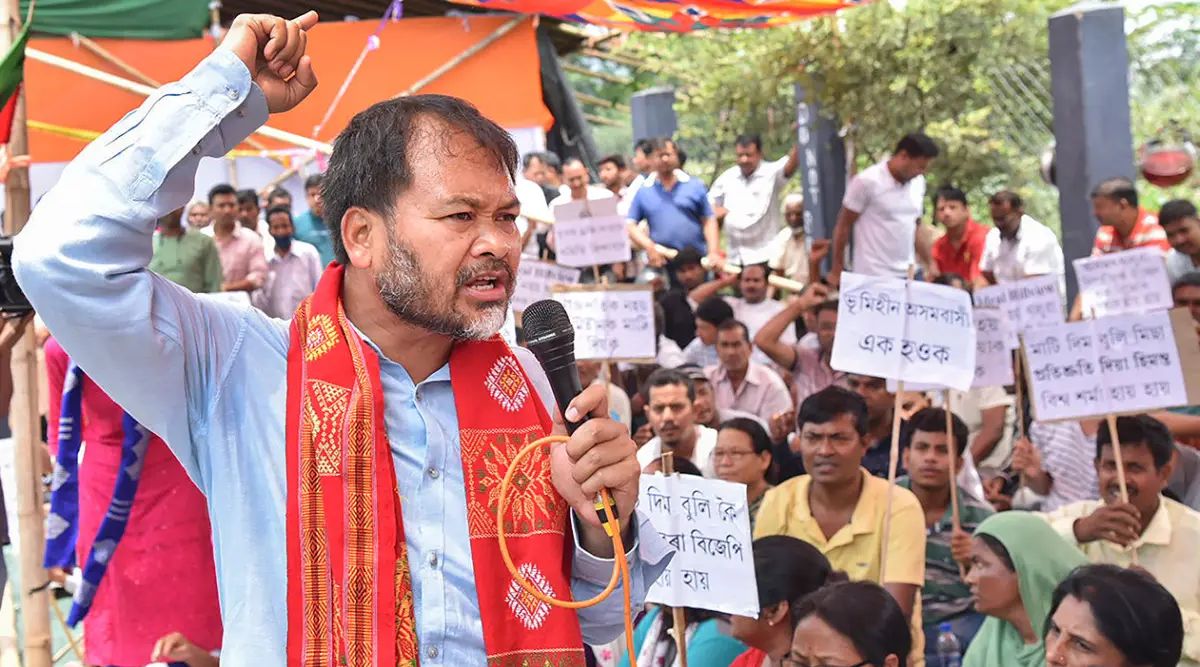Since the announcement last week, opposition parties, literary bodies and student unions have criticised the government saying that the decision violates the spirit of the National Education Policy 2020

As opposition parties, literary bodies and student unions in Assam continue to oppose the recent Cabinet decision to teach science and mathematics in English in vernacular schools from class 3 onwards, Education Minister Ranoj Pegu said that the government’s step was not to be construed as a “move away from mother tongue”, but an “added emphasis” on the English language.
“Not a single school will cease to be vernacular-medium… students will continue studying in vernacular languages, it is just that we are giving an additional push to English, while keeping vernacular languages intact,” Pegu told The Indian Express. He added that many, after studying in vernacular medium up till class 10 or 12, often find it difficult to switch to English for degree courses. “It should be a gradual transition to English — and that is why our idea is to start the process early.”
Last week, among the slew of education reforms announced by the Himanta Biswa Sarma-led Cabinet, was one that said that mathematics and science will be taught in English in all government and provincialised Assamese and other vernacular medium schools from the next academic year. Apart from that, the government also announced that it would be introducing “dual medium of instruction” in Assamese and other vernacular schools from Class 8 onwards — with the school authorities at liberty to introduce English medium, without abolishing vernacular medium.
Since the announcement, several groups have criticised the move, saying that it violates the National Education Policy 2020, based on promoting education in mother tongue. “It is against the spirit of new education policy — the move will have a negative impact on Assamese language, regionalism and culture,” said Sibsagar legislator Akhil Gogoi, who, on Wednesday, staged a sit-in protest outside the Assam Secretariat complex, demanding that the government revoke the decision. He said that “lack of quality education, infrastructure, teachers” was what was ailing education in Assam, “The government should focus on those issues…the medium of instruction is not the problem,” he said, adding that the move could potentially be a “death knell” for Assamese-medium and other vernacular schools.
When implemented, the move would impact about 60 lakh students who are currently enrolled in government schools across the state. In Assam, while majority of government schools are Assamese-medium, there are also Bengali-medium, Hindi-medium, Bodo-medium, Karbi-medium schools, among others. There are English-medium schools too, but it’s a minuscule portion, comprising less than one per cent.
Leader of Opposition, Congress’s Debabrata Saikia added that the move was “anti-Assamese”. “There are definitely some business interests behind the move…the government could be possibly looking to privatise these schools,” he alleged. The government had earlier also said that they would discontinue provincialisation of schools and colleges, while some high schools (currently under the state board) would be transferred to the CBSE.
Literary bodies and students unions, too, have registered their protest — the Asom Sahitya Sabha, Bodo Sahitya Sabha, All Assam Students’ Union (AASU) and All Bodo Students Union (ABSU) earlier submitted a joint memorandum to the chief minister demanding the decisions be revoked.
“We are not anti-English, but children should have the choice of choosing which language they want to learn in…it will be a major language burden for young children,” Toren Boro, president of Bodo Sahitya Sabha. Added Kuladhar Saikia, president of Asom Sahitya Sabha: “Science and maths are always better taught in vernacular language so that the concepts are better grasped by students.”
Explaining why class 3 was selected as the starting year to use English for Maths and Science, Pegu said that the NEP proposes that Class 3 to 5 be considered as a “preparatory stage” of learning. :So apart from students having the opportunity to study subjects in their mother tongue, whether it is Assamese or Bengali or Bodo, there is an equal opportunity to learn English as well. So they will master two languages,” he said.
Dismissing allegations that the move was “anti-mother tongue”, Pegu said the government was actually focusing on mother tongue. “Pre-primary education — from age to 3 to 8 — focuses on mother tongue. Our decision does not affect the vernacular medium, but gives a boost to English…today, English plays an important role, not only in education but politics and economics too. Students also need to prepare for all India competitive exams,” he said
Regional party Assam Jatiya Parishad (AJP) said that the argument was baseless. “Students from Assamese medium (and other vernacular medium schools) have achieved in different fields across the world,” he said, adding that it was the government’s duty to “protect and safeguard” Assamese and other regional languages.





































